- Home
- A. S. King
Ask the Passengers Page 2
Ask the Passengers Read online
Page 2
“Fantasy?” Mom says. “Seriously, Astrid. You’re the editor. You should set the bar.”
Instead of replying with my usual open-your-mind speech, I send love to my mother. Mom, I love you even though you are a critical, unforgiving horror show. This casserole sucks, but I like the way you roasted the walnuts.
“We’re starting the first unit of the Socrates Project in humanities next week, and I’m kinda excited,” I say. Mom nods, even though she has no idea what the Socrates Project is… because I haven’t told her. “I think I’ll just be happy to stop talking about Zeno and his dumb motion theories.” I haven’t told her about Zeno, either.
“And how’s Kristina?” she asks. She’s using the Kristina tone—a weird mix of jealousy and I-know-something-you-don’t-know because she and Kristina text each other a lot and she thinks I don’t know this.
“Fine.”
“Any word on Homecoming?”
“We vote Friday.”
“I know Kristina’s really excited about it.”
“Yeah.”
“I think she has a real chance to win. She has all the right qualities,” she says.
I am annoyed that she thinks she knows more than I do about Kristina. Believe me, if she knew half of what I know, she’d probably choke on this awful aubergine casserole and die right here in her four-hundred-dollar shoes.
“What qualities are those?” I ask.
She takes a sip of her wine. “You know. She’s just such a great representation of what this town is all about.”
“True,” I say. Because it’s true. Kristina is exactly the opposite of what she seems, and that’s a perfect representation of Unity Valley.
Then Dad tells us about how boring it is to work in his new office cubicle all day, talking to people on the phone about microprocessors and systems analytics while looking over his shoulder for the outsourcing memo. (His last job lasted eight months before the company moved to Asia. The job before that lasted eleven.)
“To top it all off, while I was at lunch, someone borrowed my stapler and broke it.”
“Aw, poor Gerry,” Mom says.
“Hey, that was my favorite stapler. It was ergonomic,” he says.
Without a moment’s sympathy, Mom launches into her day (hellish clients, dumb photographers, bitchy magazine editors) between gulps of wine and mouthfuls of eggplant. She could go for an hour, I bet.
We all eat as fast as we can to get out of here.
Then, after the dishes are done and the kitchen is cleaned, Ellis goes for her nightly jog on well-lit Main Street with two of her small-town teammates, Dad sits down in the quiet room to read a book, Mom goes back to her office, and I go out into the backyard to talk to the passengers.
3
ASTRID JONES SENDS HER LOVE. FROM A PICNIC TABLE.
I MADE THIS PICNIC TABLE with Dad the summer before junior year. I was sick of making birdhouses. Seriously. How many birdhouses can two people make before they run out of things to say? Before they run out of space to put them? Our backyard was an ode to nesting and flight—part bird zoo and part art exhibit.
They’d say: It’s very unique.
Dad had the whole summer off on account of his temporary unemployment, and Mom was staying with friends back in New York City to do some well-paid consulting for a month. Ellis was at summer sports camp for a week, and it was just Dad and me. Dad hadn’t discovered pot yet. He was a late bloomer, I guess.
So we built the table and moved it to the back patio, and even though Mom hates eating outside, she lets us do it about twice a summer just to be normal small-town people, the way she wants us to be.
The rest of the time, the table just sits here with nothing to do. So I lie on it and I look at the sky. I see shapes in the clouds by day and shooting stars by night. And I send love to the passengers inside the airplanes. It makes me happy. Anyone looking on might think I was smoking Dad’s pot, I bet. Lying here, grinning.
But it feels good to love a thing and not expect anything back. It feels good to not get an argument or any pushiness or any rumors or any bullshit. It’s love without strings. It’s ideal.
Tonight I spot a small jet and I concentrate on it and I stare at it and smile. Its very existence proves Zeno of Elea wrong. If motion was impossible, there would be no such things as airplanes. Or departure times. Or arrival times. I send my love up in a stream of steady light and in my head I think: I love you. I love you. I love you. I love you.
PASSENGER #4657
HEIDI KLEIN, SEAT 17A FLIGHT #879
NASHVILLE TO PHILADELPHIA
I stare at him because I can’t believe he just said that.
“What?” he asks.
“Did you really just say that?” It’s rhetorical, that question. I know what he said.
“What?” he says again, this time smiling that smile at me because he knows I can’t resist it. This is how he convinced me to let him move into our apartment. He said he’d rather sleep on the couch and pitch in rent than stay in that shitty dorm room with his dorky roommate. Then he smiled just like this.
“I’m fighting with you over how you can’t cook anything and how I have to come home from chem lab to a stinky apartment and no dinner and you tell me this now?”
“Yep.”
“You love me?”
“Uh-huh.”
I can’t help but smile back at him. “We only met two months ago.”
“So?”
“So you can’t love me,” I say.
“Why not?”
“Because you don’t know the real me, right?”
“We’ve lived together for two months, Heidi. You make great coffee. You’re always late for work. You use moisturizer in your hair as mousse. I’ve washed your underwear.”
“Still doesn’t get you out of making dinner once in a while,” I say.
“But I still love you.”
I still can’t believe he’s saying this. “Why’d you choose to tell me this now?”
“I don’t know. I guess it just came out.”
“After two months,” I say.
“After two months,” he says.
I want to say so many things. I might even want to say… it. But instead, my head fills with signature Heidi Klein snark-and-logic combo. You can’t love me. I don’t have a soul, so I don’t believe in soul mates. We’re nineteen. Next thing you’ll be asking me to marry you. Seriously, did you forget to take some meds this morning?
He looks misty. The way my mother was when I left to go to college in September. I hated all that misty crap. Maybe I’m codependent and I’ve replaced my mother with Ron. Oh, God. Maybe I need all that misty crap. Shit.
“Can we save this for later?”
He smiles again. His dimples pop. “Let me out,” he says. “I need to take a leak.”
I get up and let him out and plop down in the window seat for a while. Clear skies—I can nearly make out the landscape below, but it’s still blurry. And then something crazy hits me and I say, “I love you, too,” without any reason to. It’s like I’m not in control of my mouth or something.
And on the one hand, I’m glad Ron wasn’t here to hear it, but on the other hand, I hope he gets back soon. I miss him already.
4
CLAIRE NEVER QUITS.
HUMANITIES CLASS IS a little like a shield I can put on every morning that will protect me from people like Aimee Hall and her pack of gossiping, tennis racquet–hugging compulsive hair-straighteners.
The room is filled with kids who either own Albert Camus T-shirts or read Kafka for fun on weekends. Okay—there are a few people here who just do it because it looks good on their college applications. But no matter what group you fit into, in humanities class you can speak your mind and Ms. Steck will listen. At the moment, we’re debating how I can’t accept that Zeno got away with questioning motion.
Every time we’ve talked about his “motion is impossible” theory, I do the same thing. I stand up. I swing my arms aro
und. I say, “Motion is possible. Check it out!” Today is no different.
“Back it up with an argument,” Ms. Steck says.
I swing my arms more wildly and pretend to tap-dance in place. “Motion is totally possible! Hello!”
“That’s not an argument,” she says.
“I think it is. Imagine the argument was Astrid has two arms, but I had only one, and my right arm was a stump, and I could show it to you right here in your face. Wouldn’t that be proof enough to move on to the next argument? Wouldn’t the stump be argument enough to prove that Astrid had only one arm?” I ask. “So me standing here moving is proof that Zeno was wrong and silly and just wasting our time. Motion is possible, and everyone in this room knows it.”
Ms. Steck just looks at me.
I add, “Maybe saying motion is impossible was his way of getting out of doing chores. Maybe it got him laid or something. But it’s totally ridiculous. Look!” I swing my arms even more wildly.
Two kids—Zeno lovers—in the back row keep trying to explain to me. “That’s the point!” one says. The other nods. “To argue things out to the most absurd!”
Ms. Steck reminds me of the arrow—one of Zeno’s arguments. The idea is that an arrow shot at a target has to move through time, but since time is made of tiny moments, the arrow, in each tiny moment, is at rest and not moving.
“That’s like saying that if I take a picture of Clay”—I point to Clay, who is wearing his Kurt Vonnegut asterisk T-shirt today—“while he’s running hurdles and I freeze that moment in time… that he never really moved during the race.”
Ms. Steck says, “Yes. That’s a little like what Zeno was trying to say.”
“Which brings me back to: This is a waste of time! We all know Clay runs hurdles and wins medals. And he must have moved to get here today, right? Although, if I can use this as an excuse to get out of going to trig next, then I might just shut up.”
The class laughs, and I tell Ms. Steck that I am happy to move on from Zeno and his dumb theory. “I understand what he was doing, but I still think it’s stupid,” I say.
During free time at the end of class, while most people are writing their short paper on Zeno or finishing their homework for other classes, I hit the Internet, and I find someone who has something more important than “motion is impossible” to offer from around the fifth century BC.
Hippocrates. Father of Western medicine. He said this: “There are in fact two things, science and opinion; the former begets knowledge, the latter ignorance.” Now tell me motion is impossible seems remotely important next to that shit.
After I make it to fourth-period trig (because I moved my legs to walk there, and motion is totally possible), I realize this is what trig sounds like to me: “Hgdj gehuoidah zdkgj szhdgouij fhhhf ldldfuhd. Ujfrekuhjd fhdy. Ksdihfh. 54 46 34 23. Iuhfg.”
I realize I only took trig because everyone else takes trig. I realize that I took trig because Mom said, “Well, of course you’re taking trig. You’re going to college, right?”
I tune out everything that Mr. Trig is explaining, and I walk through my options. I can change this. I have a choice. I decide to see the guidance counselor after lunch to set myself free. I decide to schedule something cooler for fourth period. Maybe I can still get into a yoga gym class, or maybe there’s still a spot in ceramics. Worst comes to worst, I can always take a study hall.
The bell rings. I don’t take down the nightly reading or homework assignment from the board. I leave my textbook and graph paper on Mr. Trig’s desk. I have mentally just quit trig. This makes me so happy, I smile through the rest of the day.
Eighth-period European history. I am still so happy about just dropping trig, it is impossible to stop smiling. But we are watching a documentary about the Holocaust. There are dead bodies piled up everywhere. Starving people in concentration camps. Gas chambers. This isn’t right, me smiling like this.
They’ll say: Did you see Astrid Jones in EH today? Smiling at those Holocaust films?
The film footage stops, and a youngish guy with an English accent appears on the screen. He seems to be sitting in a room of Holocaust artifacts. Skulls, hair, teeth. He’s telling us how the Nazis killed more than just Jews. Yes, six million Jews were exterminated, but five million other civilians were, too. He says we often overlook these five million. I think he’s right. I’d never heard of them before right now.
He lists them. The Poles, the Ukrainians, the Yugoslavians, and the Russians. The blacks, the Gypsies, anyone of mixed race, the mentally or physically disabled and the homosexuals.
“At least the Nazis had that right,” Kevin Herman says from the back row.
The rest of the back row laughs. The film goes on. Mr. Williams either didn’t hear Kevin or has become really good at ignoring him.
The man explains the imprisonment and murder of Jehovah’s Witnesses, and how they were forced to wear purple armbands. The footage is black and white, but I can see armbands. I imagine they are purple. He explains that while we might know that Jews were forced to wear yellow stars, we may not know that homosexuals were forced to wear triangles. Pink triangles.
It occurs to me here that though I am no longer interested in triangles, I am interested in pink ones. I’m just still not so sure how interested I am.
“The gas chamber was too good for them,” Kevin says.
The back row sniggers again.
I read books about schools that have gay/straight alliance clubs. These are fictional books. And so I believe gay/straight alliance clubs must also be fictional. We certainly don’t have them here. We have a sign in the entrance hall that says THIS IS NO PLACE FOR HATE, but that doesn’t actually make it no place for hate.
If we have anything, we have Holocaust deniers. We have neo-Nazis. We have the Ku Klux Klan. They leave invitations in our mailbox every few years with mints—individually packaged melty mints with the KKK symbol on the wrapper. It’s 2012 and we still have them.
This whole town is frozen in time. Stuck in one place. Motionless. Except for me, because I just quit trig, which proves motion is totally possible, even if it means I now have to go home and tell my parents and listen to my mother talk about how quitters never win and winners never quit.
“Look at me!” she says. “I wanted to quit art school in my first semester, but did I? No. I carried on and went all the way through and got my master’s. And that master’s is feeding this family now!”
The only good thing about this conversation is that Friday is pizza night and I get to eat slices of white pizza with broccoli and garlic and drink a birch beer while I listen.
“Couldn’t you get a tutor or something? I don’t think it will look very good on your school records that you quit something, will it, Gerry?” She pours herself another glass of red from the bottle next to her glass.
Dad sighs. “You’re not heading for the sciences, are you, Astrid?”
“Nope,” I answer. I’ve told them my plan a hundred times: Move back to New York City and be an editor.
“It was only pissing you off, dropping your GPA and making your life harder. It’s senior year. You’re supposed to be having fun.”
“Oh, my God,” Mom says. “You sound like a hippie!”
“Pass me the wine,” Dad says. He rarely joins her, but it’s Friday and the stapler-stealing-and-breaking person at work hasn’t come out to apologize yet and it’s driving him crazy.
He pours himself a glass and looks her straight in the eye. “Just because you don’t know how to have fun doesn’t mean the kids can’t,” he says. “Astrid knows what she wants to do. Who gives a shit if she dropped trig? She was never going to use it!”
“It’s quitting,” she answers. “And quitters never win.”
“Oh, my God, you’re like a broken record, Claire. You know, some quitters do win. Plenty of them.” He adds, “Why can’t you just be nice to her for once?”
The question hangs in the air for a minute. Ellis gives me a jealous
look. As if it’s my fault that this whole family doesn’t revolve around her. Sheesh.
Mom looks at Ellis and me. “Go upstairs.”
We sit there for a second because we don’t know what to do. We’re not done eating yet.
Ellis quietly says, “But I’m not done eat—”
“Go upstairs!” Mom yells.
We go upstairs. But the two-hundred-fifty-year-old walls and floors are thin, and we hear the fight from our bedrooms. All the usual stuff. She can’t have fun because Gerry is a loser. Gerry doesn’t understand her needs. Gerry can’t even hold a steady job. Gerry never listens. Gerry cares more about “your fucking stapler than your wife.” Gerry is the perfect example of “quitters never win” because he quit law school.
After ten minutes of this, we hear Dad’s chair move. He doesn’t say a word and starts running the water for the dishes as she clip-clops up to her office because, you know, “someone has to work around here.”
I don’t like how pot has taken my dad away from me, but I like how it’s given him the balls to stick up for me like that. I send love from my bedroom. Dad, I love you for saying what you said at dinner. I know it was hard because Mom has chopped off your balls and baked them in a testes casserole, but thank you for trying. It means a lot.
Ellis comes to my door. Sometimes she’s like a real sister—the way we were when we were little when we’d watch The Wizard of Oz and she’d curl into my side when the flying monkeys would come. Sometimes she needed me, I guess. Not very often anymore.
“I’m sneaking down. Want me to bring you back some pizza?”
“Nah, I’m good,” I say, even though I’m still kind of hungry. “Thanks anyway.”
5
I WORK WEEKENDS.
I COULD HAVE PICKED any job—the usual fast-food places or playground summer positions. I could have stayed with friends of the family and interned in New York at some publishing house, as Mom suggested. But in June of junior year when Mom pushed (if you don’t get a summer job now, I’ll get one for you) I chose Maldonado Catering. Juan and Jorge (neither of them a Maldonado, for what it’s worth) are both really nice. Jorge interviewed me and gave me the job in about twelve seconds.

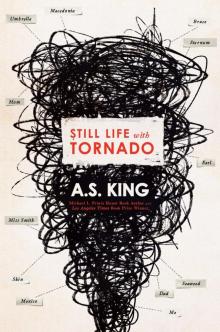 Still Life With Tornado
Still Life With Tornado Ask the Passengers
Ask the Passengers Glory O'Brien's History of the Future
Glory O'Brien's History of the Future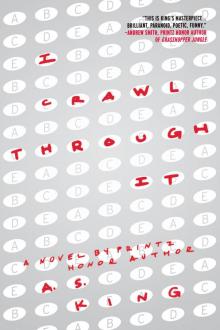 I Crawl Through It
I Crawl Through It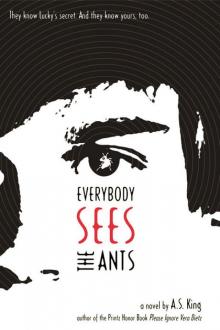 Everybody Sees the Ants
Everybody Sees the Ants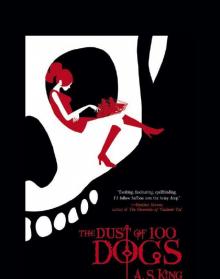 The Dust of 100 Dogs
The Dust of 100 Dogs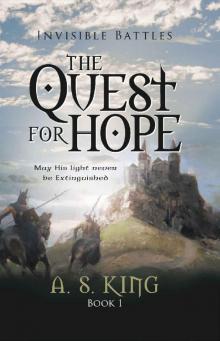 The Quest for Hope | Christian Fantasy Adventure (Invisible Battles Book 1)
The Quest for Hope | Christian Fantasy Adventure (Invisible Battles Book 1)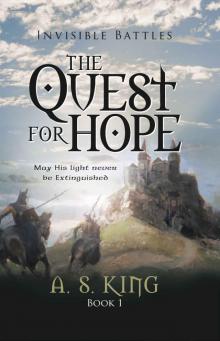 The Quest for Hope | Christian Fantasy Adventure
The Quest for Hope | Christian Fantasy Adventure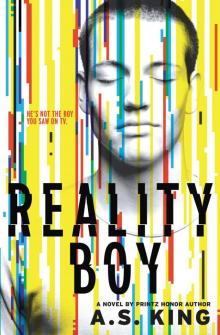 Reality Boy
Reality Boy Please Ignore Vera Dietz
Please Ignore Vera Dietz